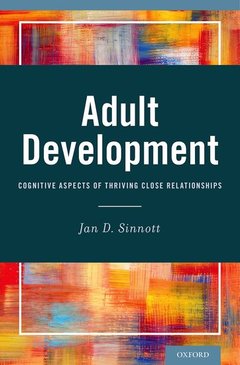Description
Adult Development
Cognitive Aspects of Thriving Close Relationships
Author: Sinnott Jan D.
Language: English
Subject for Adult Development:
Publication date: 08-2014
Support: Print on demand
Support: Print on demand
Description
/li>Biography
/li>
Relationships, especially close relationships, are among the most important aspects of life for most of us. Close relationships reach to the very heart of our happiness --but exactly what processes or skills, over the course of a lifetime, help us learn to relate to one another more and more deeply, and to grow past the differences and problems that might divide us? Adult Development applies the concept of complex postformal thought in order to explore how certain cognitive processes support individuals' close relationships such that those relationships grow stronger and richer over time. Complex postformal thought allows a person to deal with everyday logical contradictions by letting that person understand that "reality" and "meaning" are co-created. In this way, postformal thought enables adults to bridge two contradictory but logical positions and reach an adaptive synthesis of them through a higher-order logic. Taking this inquiry a step further, Sinnott examines the role played by postformal thought in intimate relationships -- those between spouses, partners, parents and children, siblings, and close friends. Sinnott argues that postformal thought seems to develop later in life and is somewhat akin to the concept of wisdom. Based on 30 years of research, this book diverges from typical contributions to this field by discussing positive adult development in the context of close relationships. Rather than focusing on the emergence of deficits of adulthood and particularly aging, Sinnott instead explores the cognitive processes that are important in creating and sustaining close ongoing relationships.
Jan D. Sinnott, PhD, is a Professor of Psychology at Towson University in Baltimore, MD. She specializes in lifespan development applying existential, positive, trans-personal and body-mind concepts to the question of how we construct satisfying lives with others in our complex and rapidly changing environment. She developed her theory of post-formal thought during her Postdoctoral time at the National Institute on Aging (NIH) and uses it to bring order to the complex understanding necessary to create a satisfying adult lifetime. Based on her ongoing research, she has authored/coauthored over 100 scholarly and applied books and other publications applying her theory to subjects as varied as memory, mindfulness, and re-inventing the university.
© 2024 LAVOISIER S.A.S.
These books may interest you

Cognition in Close Relationships 58.78 €



